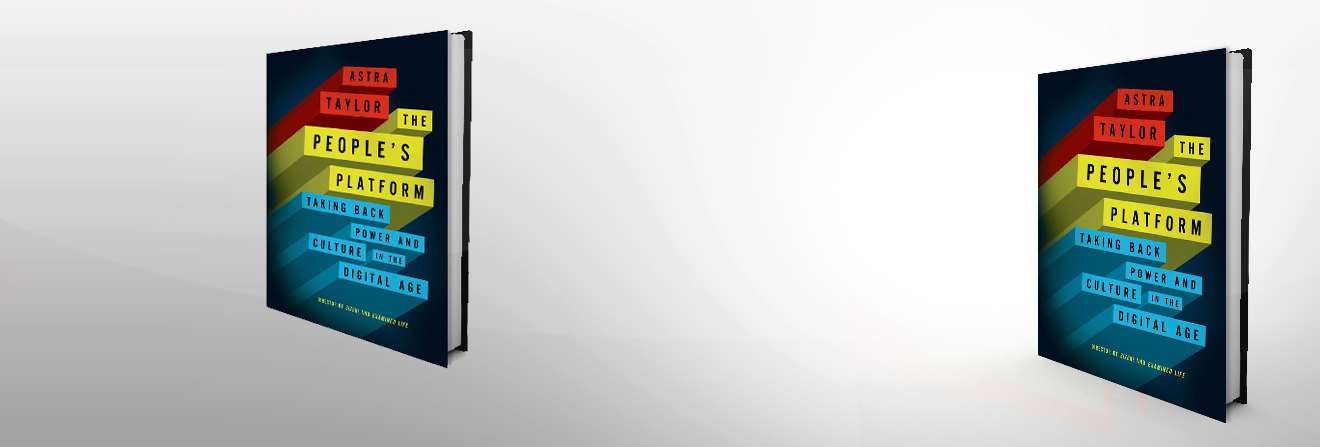Book Review: The People’s Platform (2014) by Astra Taylor
The debate on the internet and web policy is starting to shift. A decade ago it was framed as a black-and-white issue with radical activists, creative file-sharers and new economy start-ups facing off against big government, grumpy artists and old economy’s big business. It was a struggle between new vs. old, smart vs. dumb, and generous vs. greedy and where a slogan such a Google’s ”don’t be evil” made a lot of sense.
Politically, much of the radical left in both the US and Europe positioned itself against corporate control of internet infrastructure and the copyright-dependant business models of film, music, software and computer game production companies. Instead, the internet was going to usher in a new era of sharing and informal, free creativity.
Perhaps creativity is free but creation is not. Astra Taylor is a Canadian-American writer and filmmaker with her claim to fame being documentaries about contemporary philosophers, such as Slovenian firebrand Slavoj Zizek. She was also involved in the Occupy Wall Street movement.
Her book The People’s Platform, taking back power and culture in the digital age has been called a ”No Logo” for the internet, and shows a shift in the attitudes of left-wing thinkers towards the internet. Far from being liberating, Taylor describes the structure of current web culture as a continuation of monopolistic capitalism. Inspired by the cultural criticism of the Frankfurt School she states that cultural creators are being exploited by the Tech industry’s content aggregators. Referring to the work of economist William Baumol, Taylor argues that the costs of creating culture are unchanged, while the revenues have plummeted. “We are at risk of starving in the midst of plenty” Taylor writes, “Free culture, like cheap food, incurs hidden costs”.
Taylor is certainly critical of how the Hollywood studio system, record companies etc. used to work but their business models provided paychecks, stability and a way for creators to reach their audiences. The online companies rely for their content, and hence for their profits, on the work of cultural creators. The internet has shown itself to be even more prone to monopolies. Companies such as Amazon, Google, Facebook, and Apple dominate the market in a unprecedented fashion, shaping cultural creation and other businesses to conformity, according to Taylor. The big stars are able to survive in this environment, but many of ”the creative middle classes”, people able to make a living of their skills and talents without being the top, are not. The opportunities for small artists or new, challenging acts to develop themselves are minuscule, as the chance to go viral.
Companies such as Amazon, Google, Facebook, and Apple dominate the market in a unprecedented fashion, shaping cultural creation and other businesses to conformity
Online companies distance themselves from the downside of the business model they have instituted through the web, replying that they are ”just running a platform” and thus not involved. Meanwhile culture is getting ever more standardized, simplified and shallow in order to rank high on the search engines and in the social media. Culture is reduced to content.
The book blends reportage, interviews, research, with her own experiences and opinions. It provides a good summary of the thoughts of thinkers such as Nicholas Carr, Evgeny Morozov and Jaron Lanier, contrasting them to Clay Shirky and Kevin Kelly, but it does not add that much to their debate. Despite certainly favoring one side, Taylor does not want to fall into either of the two current camps of internet debate, the curmudgeons vs. the techno-utopians.
Taylor wants to find solutions to the current cultural predicament, but her vision of a more equitable internet, the People’s platform of the title, mainly involves the government financing more cultural creation and expanding the public service model for journalism. Patronage models tend to concentrate the rewards even further, while also engineering cultural output.
In the 19th century, culture moved into a particularly successful era, when the patronage model was complemented with the publishing houses, art galleries, and newspapers providing a mass market. Taylor argues against the market, but the aggregating business models work in a void of contracts and codes of conducts left by legislation moving away from institutions such as markets and copyright.
Markets need to be rebuilt, rather than dismantled. In combination with enabling models like tax deductions, the government’s role to maintain a diverse market would be to enforce these institutions. Technology might enable the development with new code, as the often absurd penalties are due to the extreme costs of identifying and processing breaches.
The take home point from the book is that changing the internet is not ”breaking the internet”. It can, and should, develop in order to meet new demands and challenges. Evolution is the true ”People’s platform”.
Waldemar Ingdahl
CEO, think tank Eudoxa


